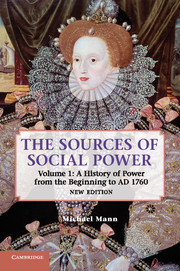Book contents
- Frontmatter
- Contents
- Preface to the new edition
- Preface
- 1 Societies as organized power networks
- 2 The end of general social evolution: how prehistoric peoples evaded power
- 3 The emergence of stratification, states, and multi-power-actor civilization in Mesopotamia
- 4 A comparative analysis of the emergence of stratification, states, and multi-power-actor civilizations
- 5 The first empires of domination: the dialectics of compulsory cooperation
- 6 “Indo-Europeans” and iron: expanding, diversified power networks
- 7 Phoenicians and Greeks: decentralized multi-power-actor civilizations
- 8 Revitalized empires of domination: Assyria and Persia
- 9 The Roman territorial empire
- 10 Ideology transcendent: the Christian ecumene
- 11 A comparative excursus into the world religions: Confucianism, Islam, and (especially) Hindu caste
- 12 The European dynamic: I. The intensive phase, a.d. 800–1155
- 13 The European dynamic: II. The rise of coordinating states, 1155–1477
- 14 The European dynamic: III. International capitalism and organic national states, 1477–1760
- 15 European conclusions: explaining European dynamism – capitalism, Christendom, and states
- 16 Patterns of world-historical development in agrarian societies
- Index
- References
16 - Patterns of world-historical development in agrarian societies
Published online by Cambridge University Press: 05 July 2013
- Frontmatter
- Contents
- Preface to the new edition
- Preface
- 1 Societies as organized power networks
- 2 The end of general social evolution: how prehistoric peoples evaded power
- 3 The emergence of stratification, states, and multi-power-actor civilization in Mesopotamia
- 4 A comparative analysis of the emergence of stratification, states, and multi-power-actor civilizations
- 5 The first empires of domination: the dialectics of compulsory cooperation
- 6 “Indo-Europeans” and iron: expanding, diversified power networks
- 7 Phoenicians and Greeks: decentralized multi-power-actor civilizations
- 8 Revitalized empires of domination: Assyria and Persia
- 9 The Roman territorial empire
- 10 Ideology transcendent: the Christian ecumene
- 11 A comparative excursus into the world religions: Confucianism, Islam, and (especially) Hindu caste
- 12 The European dynamic: I. The intensive phase, a.d. 800–1155
- 13 The European dynamic: II. The rise of coordinating states, 1155–1477
- 14 The European dynamic: III. International capitalism and organic national states, 1477–1760
- 15 European conclusions: explaining European dynamism – capitalism, Christendom, and states
- 16 Patterns of world-historical development in agrarian societies
- Index
- References
Summary
The role of the four power sources
We have reached the end of this long history of power in agrarian societies. We can now pause to ask the obvious question: Amid all the detail, can we discern general patterns of power and of its development? We shall not be in a position to give a proper answer to the question until we have compared agrarian to industrial societies, these being the subject matter of Volume II. In any case a proper answer is necessarily complex and lengthy, to be attempted in a third volume. But we can discern provisionally some of the general contours of that answer.
The general lineaments of power have been obvious in every chapter since I presented my formal model in Chapter 1. I have narrated a history of power in society – and, therefore, almost a history of society tout court – in terms of the interactions of four sources and organizations of power. The interrelations of ideological, economic, military, and political power, treated systematically, have provided, I would argue, an acceptable overall account of social development. Therefore, the history of the societies discussed here have been patterned primarily by these power networks rather than by other phenomena. Of course, such an assertion requires qualification. As I noted in Chapter 1, any account of society pushes some aspects of social life to center stage and others to the wings.
- Type
- Chapter
- Information
- The Sources of Social Power , pp. 518 - 542Publisher: Cambridge University PressPrint publication year: 2012
References
- 1
- Cited by



